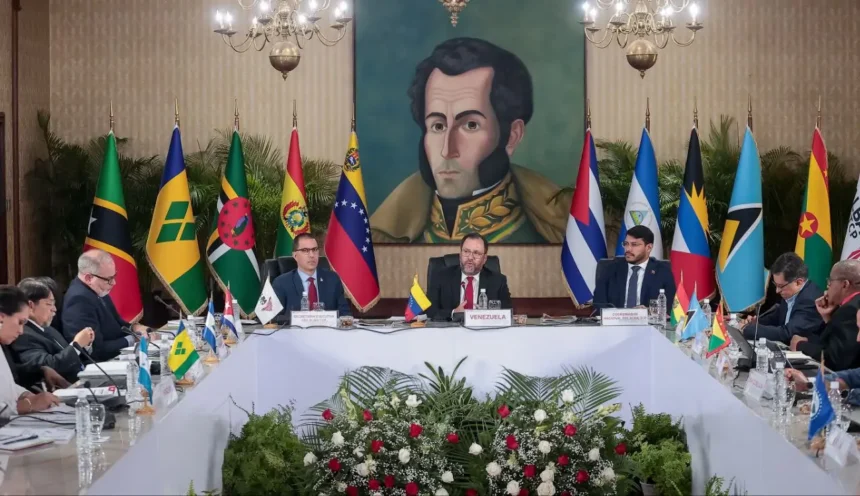Delegations from member countries of the Bolivarian Alliance for the Peoples of Our America-Peoples’ Trade Treaty (ALBA-TCP) met this Friday at “Casa amarilla Antonio José de Sucre” in Caracas to draft a proposal outlining action lines aimed not only at achieving the goals set forth in the 2030 Strategic Agenda but also at addressing the political, geopolitical, and economic challenges of the 2025-2030 period.
The People’s Power Minister for Foreign Affairs of the Bolivarian Republic of Venezuela, Yván Gil, announced that on Saturday, during the 24th ALBA-TCP Summit in Caracas, this proposal document will be presented to Venezuela’s host President Nicolás Maduro. The proposals are designed to “position the Alliance as a powerful geopolitical actor.”
“This is a significant challenge for these new times. Our heads of state have an important responsibility tomorrow: to chart a clear course for the coming year amid the complexity we are describing. We all understand the global implications and know we face a moment of political uncertainty in the region. Our goal is to prepare ourselves to provide greater security for our peoples,” the Foreign Minister explained.
The 24th ALBA-TCP Summit—featuring special guests from Honduras and Palestine—coincides with the 20th anniversary of this integration bloc. ALBA-TCP was established on December 14, 2004, when the then-presidents of Venezuela, Hugo Chávez, and Cuba, Fidel Castro, signed the founding agreement in Havana.
“Tomorrow, we will tell the world that, 20 years later, we reaffirm and uphold every one of the principles of solidarity, cooperation, collaboration, and complementarity that define the Bolivarian Alliance,” ALBA-TCP Executive Secretary Jorge Arreaza stated.
ALBA-TCP was founded in opposition to the failed U.S. initiative to establish the Free Trade Area of the Americas (FTAA). Its member nations include Bolivia, Nicaragua, Dominica, Antigua and Barbuda, Saint Vincent and the Grenadines, Saint Lucia, Saint Kitts and Nevis, Grenada, Cuba, and Venezuela. The bloc consistently highlights the progress of Latin America and the Caribbean while reaffirming the necessity of strengthening bonds of friendship and cooperation to support regional integration programs.
The 2030 Strategic Agenda outlines seven key lines of action: the creation of an ALBA-TCP cooperation and development agency; the study and approval of the Petrocaribe relaunch plan; endorsement of the ALBA Food plan; the formal signing and definitive acceptance of the Peoples’ Trade Treaty (TCP); the promotion of a special program for shared scientific, cultural, communication, and academic development; the relaunch of the ALBA Health plan; and the establishment of an ALBA agency to mitigate the impacts of climate change.






